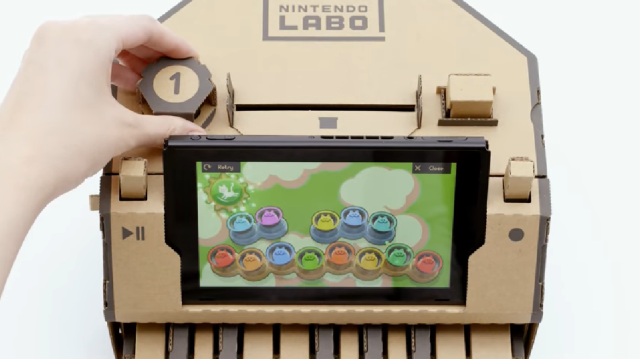
One Japanese netizen guesses that it has to do with fundamental problems in the Japanese education system.
Nintendo Labo kits are accessories to the Nintendo Switch that were released earlier this year. The sets come in cardboard pieces, which players put together and fit with the Switch’s Joycon controllers and screen to make cool tools like steering wheels and pianos that can be used with certain games. With the concept of “Make. Play. Discover”, they’re marketed for children, in the hope that kids will learn about engineering and science while building and playing with them.
Since the kits are intended to be educational, Nintendo has decided to see how the toys might fit into schools. Starting in November, in partnership with the U.S. nonprofit organization Institute of Play, the company will be giving Nintendo Switches, Labo kits, and a Nintendo Labo Teacher’s Guide to schools in the New York area and across the U.S. to see if they can be implemented into their STEAM (science, technology, engineering, art, and mathematics) programs.
We’ve already seen how some people can be pretty creative with Nintendo Labo, so it’s no surprise that Nintendo would want to see if they can be used in education. But why send them to U.S. schools, instead of schools in Nintendo’s home country of Japan? Japanese Twitter user Min Onouchi thinks that’s cause for concern, and an indication that the Japanese education system is failing.
▼ Translation below.
これなぜ日本企業が日本でなく、アメリカの小学校に配布するのかを考えた方がいい。現状日本の小学校に配布しても使いこなせる教員もいず確実に無駄になるだろうと、わたしでも思う。外部協力団体みたいのは探せば日本にもあるだろうが、学校と連携できない構造、学校職員忙しすぎるなど→ https://t.co/EajtbZJxqw
— Min Onouchi おのうちみん (@kaerumin) October 24, 2018
“We should really be thinking about why Nintendo, a Japanese company, is giving away free Labos to U.S. schools instead of Japanese ones. I think that, even if they were distributed to Japanese schools, Japanese teachers won’t know how to use them, and they’d just be wasted. If we look we could probably find organizations like Institute of Play in Japan, but because the [current educational] system would keep them from connecting with schools, teachers are too busy to use them, and all of the other problems with the Japanese school system, Nintendo probably thought they’d have a higher likelihood of success if they try it with American schools instead of Japanese ones, despite the fact that, no matter the genre, broadening kids’ horizons like this has been linked to improved development.”
The other “problems” that Onouchi mentions are clarified in a later Tweet to include “no leeway to implement new things”, and “the rigidity of the system”, in addition to overworked teachers. These are fair points to make, since it’s well known that Japanese schools are pretty inflexible, especially considering one teacher marked a student’s answer wrong for writing the number “4” incorrectly.
Onouchi had more to say, however, in two follow-up tweets that further criticize the Japanese education system:
▼ Translations below.
日本でなくアメリカではじめるという任天堂の決定は妥当だと思うし、一企業が日本の学校の問題点を全部解決するのは無理だろう。遠く将来を見据えてすそ野を広げることに消極的なのは、ノーベル賞をありがたがるだけで大学の基礎研究に金を出さないのと同じ、この国の今すぐ成果出せ主義の結果。
— Min Onouchi おのうちみん (@kaerumin) October 24, 2018
政治も経済もトップが、今すぐ結果出せ主義という病に罹患しているこの国では、目先のこまい成果を大仰にプレゼンできる(実際に成果なくても)ヤツがえらくなって同じ評価をする。このままずぶずぶと沈む未来しか見えない。
— Min Onouchi おのうちみん (@kaerumin) October 24, 2018
“I think Nintendo’s decision to start this program in America and not Japan is right. I think it’s impossible for one company to try to fix the problems with Japan’s education system. Japan’s stigma against expanding kids’ horizon is a result of our focus on accomplishment, like how only universities whose professors have won Nobel prizes will get funding for even the most basic studies.
Especially in politics and economics, people who keep achieving short-sighted accomplishments (even if they’re not really accomplishments at all) will continue to be revered and valued in this country because of our “focus on accomplishment” disease. I can’t help but think that our country’s future is steadily sinking.”
Onouchi is not the only one to believe that the Japanese education system needs revision. Nobel prize-winner Shuji Nakamura and famed educator Hirotaka Otatake might be inclined to agree. Both revered men have commented that the Japanese education system, with its short-sighted goals of passing exams and getting jobs in major companies, is not flexible enough or effective enough to prepare Japanese youth for participation in a dynamic, global world.
And yet, Onouchi’s post sparked a debate among the less-illustrious of Japan’s population, as many Japanese netizens thought there might be other reasons behind the decision, or why the Labos couldn’t be implemented into Japanese schools:
“I think there are teachers who would know how to use Nintendo Labo in their classrooms, but I think school management wouldn’t be flexible enough to allow it.”
“It’s probably because there are too many people in higher positions who would say things like ‘Famicoms don’t belong in schools!'”
“I think an important point is that they want to spread it to schools across the U.S. That’s because they have the possibility of a much wider data analysis.”
“It might simply be because the American nonprofit organization is contributing money to the project. There are probably other reasons too.”
“That might be true, but there are also probably rules against specific companies’ products being used in education, or something like that.”
“Instead of the organizations not being able to connect with the schools, wouldn’t it rather be that they just don’t have the budget for it?”
As many people pointed out, it’s possible that the decision had nothing at all do with the Japanese education system. Perhaps it was simply due to conditions in the Nintendo Labo’s success in the U.S. market, and the U.S. division proposed this project because they’re hoping to sell more by exposing more kids to the product. Or, perhaps it was not even Nintendo’s idea at all, but rather a proposal from Institute of Play. Who knows?
Still, it is rather hard to see any kind of technological fun being implemented in Japanese schools, since classrooms are still notoriously low-tech. Nevertheless, it’s not all bad, as some teachers are finding ways to reward their students for independent learning and curiosity, in spite of a system that still hammers down the nails that stick out.
Source: Techcrunch, Twitter/@kaerumin via Hachima Kiko
Top image: YouTube/Nintendo

 What’s wrong with English education in Japan? Pull up a chair…
What’s wrong with English education in Japan? Pull up a chair… Nintendo answers questions on VR, 5G and staying behind the trends: “Our priority is entertainment”
Nintendo answers questions on VR, 5G and staying behind the trends: “Our priority is entertainment” Is Japan overworking its teachers? One exhausted educator says, “YES!”
Is Japan overworking its teachers? One exhausted educator says, “YES!” Create 8-bit melodies by turning your old Nintendo cartridges into harmonicas 【Video】
Create 8-bit melodies by turning your old Nintendo cartridges into harmonicas 【Video】 Curry restaurants across Japan create social media movement: “Don’t blame the curry!”
Curry restaurants across Japan create social media movement: “Don’t blame the curry!” How to order snacks on a Shinkansen bullet train in Japan
How to order snacks on a Shinkansen bullet train in Japan Burger King Japan suddenly adds Dr. Pepper and Dr. Pepper floats to its menu nationwide
Burger King Japan suddenly adds Dr. Pepper and Dr. Pepper floats to its menu nationwide New Nintendo Lego kit is a beautiful piece of moving pixel art of Mario and Yoshi【Photos】
New Nintendo Lego kit is a beautiful piece of moving pixel art of Mario and Yoshi【Photos】 Hello, cosmetics! Clinique teams up with Hello Kitty this summer for first-time collaboration
Hello, cosmetics! Clinique teams up with Hello Kitty this summer for first-time collaboration Demon Slayer: Kimetsu no Yaiba gets new roller coaster attractions and food at Universal Studios Japan
Demon Slayer: Kimetsu no Yaiba gets new roller coaster attractions and food at Universal Studios Japan 11 different ways to say “father” in Japanese
11 different ways to say “father” in Japanese Kyoto tea merchant’s matcha parfait ice cream bars: The desserts we’ve been waiting 187 years for
Kyoto tea merchant’s matcha parfait ice cream bars: The desserts we’ve been waiting 187 years for East meets West in the Pacific-centered version of the world map
East meets West in the Pacific-centered version of the world map What do you eat when you catch a cold? We asked 11 of our Japanese reporters
What do you eat when you catch a cold? We asked 11 of our Japanese reporters Shinjuku izakaya’s all-you-can-eat-and-drink plan is one of Tokyo’s best secret cheap eats
Shinjuku izakaya’s all-you-can-eat-and-drink plan is one of Tokyo’s best secret cheap eats Nintendo history you can feel – Super NES, N64, and GameCube controllers become capsule toys
Nintendo history you can feel – Super NES, N64, and GameCube controllers become capsule toys “The most Delicious Cup Noodle in history” – Japan’s French Cup Noodle wins our heart【Taste test】
“The most Delicious Cup Noodle in history” – Japan’s French Cup Noodle wins our heart【Taste test】 Starbucks releases a cute Frappuccino and Unicorn Cake…but not in Japan
Starbucks releases a cute Frappuccino and Unicorn Cake…but not in Japan Kyoto Tower mascot termination reveals dark side behind cute Japanese characters
Kyoto Tower mascot termination reveals dark side behind cute Japanese characters McDonald’s Japan’s Soft Twist Tower: A phantom ice cream only sold at select branches
McDonald’s Japan’s Soft Twist Tower: A phantom ice cream only sold at select branches Yabai Ramen: What makes this Japanese ramen so dangerous?
Yabai Ramen: What makes this Japanese ramen so dangerous? Finally! Nintendo Japan expands Switch 8-bit controller sales to everybody, Online member or not
Finally! Nintendo Japan expands Switch 8-bit controller sales to everybody, Online member or not Japanese government wants to build luxury resorts in all national parks for foreign tourists
Japanese government wants to build luxury resorts in all national parks for foreign tourists To combat declining birth rate, Japan to begin offering “Breeding Visas” to foreigners
To combat declining birth rate, Japan to begin offering “Breeding Visas” to foreigners 10 things you should buy at 7-Eleven in Japan
10 things you should buy at 7-Eleven in Japan Studio Ghibli releases anime heroine cosplay dresses that are super comfy to wear
Studio Ghibli releases anime heroine cosplay dresses that are super comfy to wear Woman charged for driving suitcase without a license in Osaka
Woman charged for driving suitcase without a license in Osaka Studio Ghibli unveils My Neighbour Totoro miniature house model
Studio Ghibli unveils My Neighbour Totoro miniature house model Kyoto experiencing problems with foreign tourists not paying for bus fares, but not on purpose
Kyoto experiencing problems with foreign tourists not paying for bus fares, but not on purpose Fighting mild hunger with a Japanese soda that turns into jelly in the stomach【Taste test】
Fighting mild hunger with a Japanese soda that turns into jelly in the stomach【Taste test】 Studio Ghibli’s Howl’s Moving Castle tapestry unveiled in Japan for first time
Studio Ghibli’s Howl’s Moving Castle tapestry unveiled in Japan for first time McDonald’s new Happy Meals offer up cute and practical Sanrio lifestyle goods
McDonald’s new Happy Meals offer up cute and practical Sanrio lifestyle goods Sales of Japan’s most convenient train ticket/shopping payment cards suspended indefinitely
Sales of Japan’s most convenient train ticket/shopping payment cards suspended indefinitely Sold-out Studio Ghibli desktop humidifiers are back so Totoro can help you through the dry season
Sold-out Studio Ghibli desktop humidifiers are back so Totoro can help you through the dry season Japanese government to make first change to romanization spelling rules since the 1950s
Japanese government to make first change to romanization spelling rules since the 1950s Foreigner’s request for help in Tokyo makes us sad for the state of society
Foreigner’s request for help in Tokyo makes us sad for the state of society Ghibli founders Toshio Suzuki and Hayao Miyazaki contribute to Japanese whisky Totoro label design
Ghibli founders Toshio Suzuki and Hayao Miyazaki contribute to Japanese whisky Totoro label design Doraemon found buried at sea as scene from 1993 anime becomes real life【Photos】
Doraemon found buried at sea as scene from 1993 anime becomes real life【Photos】 Tokyo’s most famous Starbucks is closed
Tokyo’s most famous Starbucks is closed Princesses, fruits, and blacksmiths: Study reveals the 30 most unusual family names in Japan
Princesses, fruits, and blacksmiths: Study reveals the 30 most unusual family names in Japan Famed educator says Steve Jobs, Bill Gates would have been ruined by Japanese education system
Famed educator says Steve Jobs, Bill Gates would have been ruined by Japanese education system Japanese politicians want workers across country to have option for three-day weekends every week
Japanese politicians want workers across country to have option for three-day weekends every week Japanese schools are losing their pools due to rising maintenance costs and aging facilities
Japanese schools are losing their pools due to rising maintenance costs and aging facilities The number of doctorate students in Japan is now almost half of what it was 17 years ago
The number of doctorate students in Japan is now almost half of what it was 17 years ago Petition to allow students to choose what they wear to school gathers almost 19,000 signatures
Petition to allow students to choose what they wear to school gathers almost 19,000 signatures Tokyo makes high school free for all families, even the rich ones
Tokyo makes high school free for all families, even the rich ones Majority of Nagasaki high schools and middle schools have white-underwear-only rules, study finds
Majority of Nagasaki high schools and middle schools have white-underwear-only rules, study finds “Students are only allowed three sneezes in class” Japanese people share their worst school rules
“Students are only allowed three sneezes in class” Japanese people share their worst school rules Japanese teen finds awesome surprise hidden inside good-luck pencil his cram school gave him
Japanese teen finds awesome surprise hidden inside good-luck pencil his cram school gave him Nintendo’s god-tier customer service continues as they offer free repairs for Noto earthquake victims
Nintendo’s god-tier customer service continues as they offer free repairs for Noto earthquake victims Shibuya gives each public elementary and junior high student a Surface Go 2 tablet for school
Shibuya gives each public elementary and junior high student a Surface Go 2 tablet for school The top 10 universities in Japan determined by 2021 World University Rankings
The top 10 universities in Japan determined by 2021 World University Rankings Japanese high schools stop asking students to specify their gender on application forms
Japanese high schools stop asking students to specify their gender on application forms ALT in Japan asked to remove earrings by Board of Education
ALT in Japan asked to remove earrings by Board of Education Teacher disciplined for drinking alcohol during class in Japan
Teacher disciplined for drinking alcohol during class in Japan
Leave a Reply